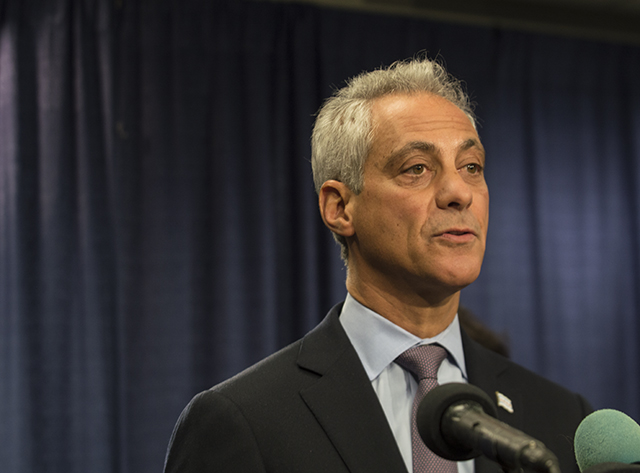Emanuel To Meet With Controversial Education Secretary Betsy DeVos Wednesday
By aaroncynic in News on Apr 11, 2017 5:29PM

Chicago Mayor Rahm Emanuel speaks at a news conference on January 13, 2017. Photo by Aaron Cynic/Chicagoist
According to WTTW’s Chicago Tonight, the pair will meet behind closed doors Wednesday morning at a yet to be disclosed location.
Last week, Trump deviated from his usual description of Chicago as a crime-ridden dystopia to instead criticize the city public schools' performance.
“If you look at so many elements of education, and it’s so sad to see what’s coming, what’s happening in the country. Even the numbers, as good—you say we’re doing better, but the numbers in New York, the numbers in Chicago are very rough,” said Trump at an event called “CEO Town Hall.” “The numbers in Los Angeles, the cities, it’s a very rough situation.”
The Mayor’s Office refuted Trump’s comments, saying that “facts don’t matter” to the administration.
“If they cared about facts and if they cared about the truth, they would know Chicago's students are outperforming their peers across the nation,” Emanuel’s office said in a statement. “Last year Chicago's students were among the nation's leaders in fourth grade reading gains and eighth grade math gains. Chicago leads all urban school districts for the increase in our graduation rate.”
Like many members of Trump’s cabinet, DeVos was a contentious nomination, particularly in Illinois. Her critics, which included both Senator Dick Durbin and Senator Tammy Duckworth, along with several community who held protests against her nomination, have called her out for financial interests in student debt collection agencies, lack of experience in dealing with public schools, lack of understanding of the Individuals with Disabilities Education Act, and extreme pro school privatization stance.
“It is abundantly clear that she lacks the necessary experience and expertise that every Secretary of Education must possess, coming up short in two particular areas: her commitment to public education and her understanding of our nation’s civil rights laws,” Duckworth said in a statement in February.
DeVos’s penchant for school privatization however, might be where she and Emanuel can find some common ground. DeVos has championed privatization schemes and voucher programs under the banner of “school choice,” while Emanuel made history by closing nearly 50 public schools in 2013.
Privatizing public schools in fact, has hurt the Chicago Public School system, which has already been struggling financially for years. A report conducted on behalf of the Project for Middle Class Renewal found that the majority of charter schools opened between 2000 and 2015 were mostly in areas that saw losses of school aged children and were located in areas that saw the highest amount of school closures.
“We were surprised to discover how much CPS has saturated charter schools in neighborhoods with declining school-age populations,” said Roosevelt Associate Professor of Sociology Stephanie Farmer in a March press release when the report was published. “We believe this decision is a strong contributing factor to the current strain on CPS’ finances.”
The report found that 20 new charter schools located within a 1.5-mile walking radius of a school closed for low enrollment have opened since 2013. Additionally, 71 percent of new charter schools opened between 2000 and 2012 were within a 1.5 mile radius of the 49 schools that closed in 2013 due to low enrollment. An audit of CPS charter schools filed with the Illinois State Board of Education in 2015 found that some 27 percent had a combined outstanding debt of $227 million (independent of CPS’s overall debt), which will be paid back with taxpayer dollars.
“The lack of rational planning and the haphazard manner in which charter school proliferation and saturation in depopulating Chicago neighborhoods has taken place undoubtedly has contributed to Chicago Public Schools’ fiscal problems,” said Farmer.